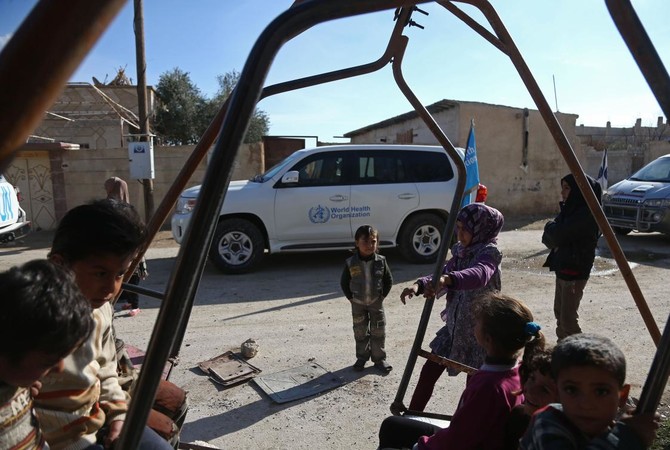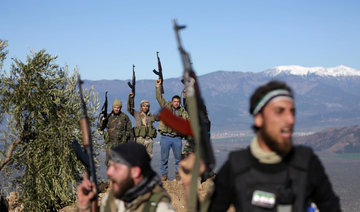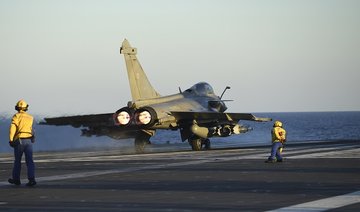BEIRUT/MOSCOW: Russia will establish a humanitarian corridor and implement a five-hour daily truce in Syria’s eastern Ghouta, it said on Monday, after a UN Security Council resolution demanding a 30-day cease-fire across the entire country.
Russia’s defense minister was cited by the RIA news agency as saying President Vladimir Putin had ordered a daily cease-fire in eastern Ghouta from 9am (0700 GMT) to 2pm (1200 GMT) each day and for the creation of a “humanitarian corridor” to allow civilians to leave.
Russia’s Defense Minister Sergei Shoigu said in a statement the pauses will start as of Tuesday. He said Russia will work to create a “humanitarian corridor” to help evacuate civilians but said the location has not been decided yet.
Shoigu also mentioned a refugee camp in Tanf, near the border with Iraq which is “under US control” — where Russia is also suggesting calling for a humanitarian pause as well.
Over the past week Syria’s army and its allies have subjected the rebel-held enclave of eastern Ghouta near Damascus to one of the heaviest bombardments of the seven-year war, killing hundreds.
On Sunday health authorities there said several people had suffered symptoms consistent with chlorine gas exposure and on Monday rescue workers and a war monitor said seven small children were killed by air and artillery strikes in one town.
UN Secretary-General Antonio Guterres appealed to the warring sides to abide by the cease-fire. Speaking at the start of a session of the UN-backed Human Rights Council, the comments were his first remarks to the UN body since the resolution was adopted.
“Eastern Ghouta cannot wait,” he said. “It is high time to stop this hell on Earth.”
Guterres said he welcomes the resolution but added that council resolutions “are only meaningful if they are effectively implemented.” He added that he expects the “resolution to be immediately implemented and sustained” and also called for safe, unimpeded and sustained delivery of humanitarian aid and services, as well as evacuations of the sick and wounded.
At the Geneva gathering, UN human rights chief Zeid Ra’ad Al-Hussein echoed calls for a “full implementation” of the truce but said that “however, we have every reason to remain cautious” about the cease-fire as airstrikes continue on Damascus suburbs.
He also decried “seven years of failure to stop the violence, seven years of unremitting and frightful mass killing” in Syria.
Meanwhile, the EU’s diplomatic chief Federica Mogherini on Monday demanded the cease-fire in Syria be implemented “immediately,” describing the resolution as an “encouraging” step but needed to be followed up with action.
The Security Council resolution was a “necessary and encouraging step but a first step,” Mogherini said.
“Now that resolution needs to be immediately implemented, to have monitoring mechanisms.”
The bloc also added Syria’s new information and industry ministers to its sanctions blacklist following their appointment last month. A total of 257 people are now subject to EU travel bans and asset freezes over their role in the Syrian conflict.
Luxembourg Foreign Minister Jean Asselborn said the situation in Ghouta was a “disgrace,” describing it as like the “Middle Ages.”
Fighting has raged across Syria since Saturday’s resolution, as Turkey presses its offensive against a Kurdish militia in Afrin, rival rebel groups fight each other in Idlib and a US-led coalition targets Daesh in the east.
The Russian defense minister, Sergei Shoigu, did not say whether the Syrian government or other allied forces had agreed to abide by the five-hour daily truce.
Mohamad Alloush, the political chief of one of eastern Ghouta’s biggest rebel factions, said the Syrian army and its allies had launched “a sweeping ground assault” after the UN resolution, adding it was vital that the truce be implemented.
“We hope for real, serious, practical action,” he said.
There was a relative calm in the besieged area in the immediate aftermath of the resolution, which was unanimously approved Saturday by the 15-member council. It demands a 30-day truce in all of Syria but excludes fighting with Daesh and Al-Qaeda-linked fighters.
However, violence has since picked up and military operations have killed at least 30 people, including women and children, in eastern Ghouta in the last 48 hours, while shelling on Damascus continues from the rebel-held area, a United Nations spokeswoman said on Monday.
“The United Nations has mobilized and is ready to immediately support life-saving aid convoys to several areas in eastern Ghouta as soon as conditions allow, as well as hundreds of medical evacuations,” Linda Tom, a UN humanitarian spokeswoman in Damascus, said in emailed comments.
DEATHS
A picture issued by Civil Defense rescue workers, which could not be independently verify, showed seven small bodies lying next to each other, wrapped in white and blue sheets, after air and artillery strikes on the town of Douma in eastern Ghouta.
The Syrian Observatory for Human Rights, a Britain-based war monitor, said four of them were among a single family of nine killed by an air strike. The other three were among seven killed by shelling in the same town, it said.
Russian Foreign Minister Sergei Lavrov said allegations the Syrian government was responsible for any chemical attack, after reports of people suffering symptoms of chlorine gas poisoning, were aimed at sabotaging the truce.
The Syrian government has consistently denied using chemical weapons in the war, which will soon enter its eighth year having killed hundreds of thousands of people and forced half of Syria’s pre-war population of about 23 million from their homes.
The bombardment of eastern Ghouta over the past week has been one of the heaviest of the war, killing at least 556 people in eight days, according to a toll compiled by the Syrian Observatory for Human Rights, a UK-based war monitor.
The intensity of the bombardment has diminished since the UN resolution, the Observatory said, but it added that 21 people had been killed in eastern Ghouta on Monday, including the seven small children in the photograph.
Rebel shelling has caused 36 deaths and a number of injuries in Damascus and nearby rural areas in the last four days, Zaher Hajjo, a government health official, told Reuters.
Speaking in Riyadh, deputy director general of the World Health Organization, Peter Salama, said the WHO urgently needed to evacuate 750 medical cases from eastern Ghouta.
“We also need sustained access for medical equipment and for medical drugs and commodities,” he said, adding that some supplies had been “systematically removed from convoys.”
RELATIVE LULL
In eastern Ghouta, people were making use of a relative lull in the bombardment to find provisions, said Moayad Hafi, a rescue worker based there.
“Civilians rushed from their shelters to get food and return quickly since the warplanes are still in the sky and can hit at any moment,” he told Reuters in a voice message.
Lavrov said the cease-fire would not cover either the Ahrar Al-Sham or the Jaish Al-Islam factions, describing them as partners of the former Al-Qaeda affiliate, the Nusra Front.
The two major rebel factions in eastern Ghouta are Jaish Al-Islam and Failaq Al-Rahman. Tahrir Al-Sham, an alliance of militants including Nusra, also has a small presence there.
“Partners of Al-Nusra are not protected by the cease-fire regime. They are also subject to the legitimate actions of Syrian armed forces and all those who support the Syrian army,” said Lavrov.
In Idlib, Ahrar Al-Sham and Tahrir Al-Sham have been battling each other in recent days, rather than working in partnership.
Syrian state television reported that army units had advanced against militants near Harasta in eastern Ghouta. State news agency SANA also reported that the army had stopped a car bomb being driven into Damascus.
The Nusra Front has consistently been excluded from cease-fires in Syria, and the opposition says the government has used this as an excuse to keep up its bombardments.


Russia orders five-hour daily truce in Syria’s eastern Ghouta
Russia orders five-hour daily truce in Syria’s eastern Ghouta

Syria army enters Al-Hol camp holding relatives of miltants

- Al-Hol houses around 24,000 people, including 15,000 Syrians and about 6,300 foreign women and children of 42 nationalities
AL-HOL CAMP, Syria: Syria’s army on Wednesday entered the country’s vast Al-Hol detention camp that houses relatives of suspected Daesh militants, from which Kurdish forces withdrew the day before, according to an AFP journalist at the scene.
The correspondent saw a large number of soldiers open the camp’s metal gate and enter. Al-Hol houses around 24,000 people, including 15,000 Syrians and about 6,300 foreign women and children of 42 nationalities.
© 2026 SAUDI RESEARCH & PUBLISHING COMPANY, All Rights Reserved And subject to Terms of Use Agreement.














